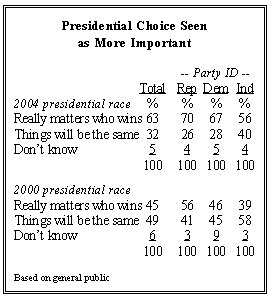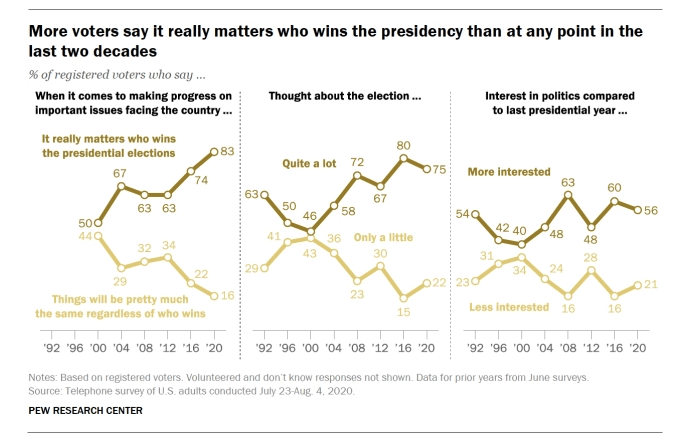
- Apathy to Action
- History of Contested US Elections
- What Can We Take from History?
- Is this the type of Contested Election People Are Concerned About?
We have had several clients ask for scenarios that pertain to the upcoming US presidential elections. Clearly there is a lot of uncertainty around an election that is more divisive than any in memory. While direct comparisons to other events in US history are hard to come by, we have certainly seen our fair share of contentious presidential elections.
As almost every reader of this post will remember, the last time the results of a US election were contested was in 2000, featuring the famous ‘hanging chad’ debacle that defined the George W. Bush versus Al Gore contest. While many Americans, particularly those on the left, would say that election was extremely important to the path of the US, partisans at the time were less passionate about the outcome, and the decision of the Supreme Court decision to award W the presidency, while always controversial, was not met with the anger and rage that it seems many are expecting if the 2020 election is contested.
Apathy to Action
From a Pew Research poll from earlier in the decade you can see that 49% of voters thought that the results of the 2000 election was relatively inconsequential, or that ‘Things will be the same’ regardless of the winner. Though after being out of power for 8 years, Republicans were a bit more passionate about the victor with 56% saying it ‘Really matters who wins’, the electorate was about as indifferent as could be imagined.

Source: Pew Research
Fast forward to the next election (2004), after 9/11, Afghanistan and the invasion of Iraq and the consequences of the election were deemed much more important to partisans and independents alike.
But in 2020, almost everyone is invested. A whopping 83% of voters think it ‘really matters who wins’ the upcoming election. And I would not be alone in arguing that everyone has decided who they will vote for. I mean, what are undecideds waiting for? What will tip the balance for them? Almost everyone has picked a side, and almost everyone thinks the future of America hangs in the balance of this election.

Source: Pew Research
The idea that the consequences of this election are higher and more important to the future of America are the heart of why our clients are asking for election-based scenarios in such high numbers. But the questions are not generally run of the mill “Trump/Biden Wins/Loses” (though I admit we have received several of those).
History of Contested US Elections
The questions center around a more troubling and difficult to model scenario where the election is contested – that the winner isn’t immediately apparent or that both sides lay claim to victory. And this is a plausible scenario as there have been 4 US presidential elections that have had contested results, so we can look to history as a guide.
- 1876: Rutherford B. Hayes (R) vs. Samuel Tilden (D) – 11 years after the end of the Civil War, a contested election with lingering pain amongst the Union/Confederacy coupled with allegations of fraud and intimidation resulting in invalidated votes led to a Congress created commission to determine the victor. Civil unrest, partisan politics and allegations of foul play defined this election. Also interesting, this election features the second largest popular vote deficit by the winning side, where Hayes lost the popular vote by over 250k (3%).
- 1888: Grover Cleveland (D) vs. Benjamin Harrison (R) – This election was characterized by bribes paid for voting Republican. Partisan politics and allegations of foul play were the defining characteristics here. As an added bonus, the loser (Cleveland) won the popular vote by about 100K (<1% of the total) votes.
- 1960: John F. Kennedy (D) vs. Richard Nixon (R) – While Kennedy won with the smallest popular vote margin of victory of the 20th century (<+0.2%), allegations of voter fraud featured prominently in the headlines.
- 2000: George W. Bush (R) vs Al Gore (D) – The election of the hanging chad revolved around Florida and a voter differential of 537 votes and 60k ballots without a presidential vote because ‘hanging chads’ prevented the votes from registering. While Bush lost the popular vote by 544k votes (<.51%), the Supreme Court ruled he won Florida and had the EC votes to win the election. Gore conceded immediately.
The one characteristic that all of these contested elections has in common is that the winning side lost the popular vote, or the popular vote was extremely close. If 2016 is our guide, a popular vote loss by the incumbent with an electoral college win is a possibility, but would it be a contested election?
What Can We Take from History?
Of the previous contested elections, the most analogous to what clients are asking about is the election of 1876 where civil unrest, partisan politics and allegations of foul play were the defining characteristics. After all, we already have civil unrest, extreme partisan politics (while difficult to judge in a historical perspective), and we had allegations of foul play before the first vote was cast.
While we don’t have great data from 1877, we do have annual stock market returns, yields and housing prices as compiled by Yale professor Robert Shiller that go as far back as 1871. And a quick analysis shows that immediately after the contested election of 1876, the stock market reacts with…a +15% total return. In fact, double digit returns are the norm in the first year after a contested election.
Stock Market Returns 1 Year after a Contested Election
Year | Total Return |
1877 | +14.9% |
1889 | +12.2% |
1961 | +18.2% |
2001 | -14.4% |
Source: Robert Shiller, Yale School of Management
Note: For consistency, I used the same source for all return calculations. Modern published indexes may yield slightly different values for 1961 and 2001.
Given that 2000 was the beginning of the end of the DotCom boom of the 1990’s, it is very easy to argue that the fact that the election was contested had absolutely nothing to do with poor stock market performance in the first year of the GWB presidency. In fact, 2000 and 2001 were also negative return events with the DotCom bust and 9/11 playing more prominently in the market performance.
This leads me to believe that a ‘normal’ contested election where power is peacefully maintained or transferred based on the courts or Congressional action will be a business as usual scenario. A Trump or Biden Bull (or Bear) market scenario based on the expected policies and actions of the president (and the Congress that president has to work with) would be valid scenarios. Even if the election is contested and much of the country is angry about the outcome, as long as the levers of power continue to function as expected, markets will march on.
Is this the type of Contested Election People Are Concerned About?
In a word, ‘no’. Clients are asking about a more sinister scenario where the loser fails to ‘lose’, or fails to concede the election and takes steps to stay in office or to take office. Or, the losers supporters fail to accept the results and civil unrest becomes even more pronounced than today. This, of course, would be unprecedented in US history (we are not Thailand after all). These scenarios could be more problematic.
And in the next post, we’ll explore what these alternative scenarios could look like.



